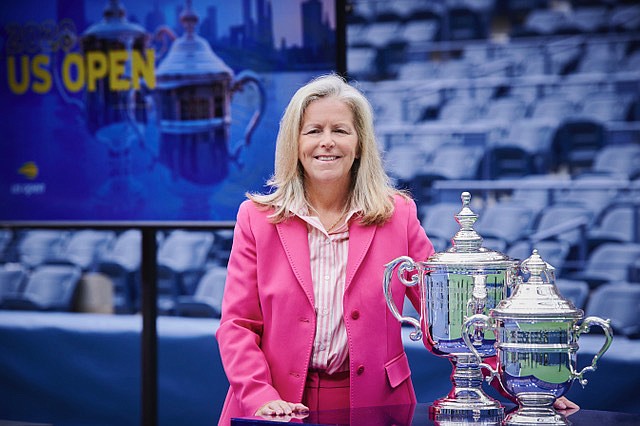- July 26, 2024
-
-
Loading

Loading

In June, Stacey Allaster, a St. Petersburg resident and the U.S. Tennis Association’s chief executive of professional tennis, became the first woman to be named tournament director of the U.S. Open in the prestigious event’s 140-year history.
Allaster, 56, has been a stalwart of the business side of pro tennis for decades, starting with Tennis Canada, when she was vice president of sales and marketing in the early 1990s. In 2006, she was named president of the St. Pete-based Women’s Tennis Association. Three years later she was named CEO.
Allaster stepped down from the WTA in 2015. She didn’t know what was next for her — but thought it was the end of her career in tennis, which began on the court as a Canadian junior player and then a teaching pro at age 16.
“I was a classic professional burnout,” Allaster says. “Ultimately, it's on me to manage my energy and take ownership of that. But I needed a break. So I was just living here in beautiful St. Pete; I was getting healthy physically and mentally and recharging.”
'It took a relentless mindset to find solutions to the new deck of cards that you were given every day, with no playbook.' Stacey Allaster, the United States Tennis Association's chief executive of professional tennis
Gordon Smith, longtime CEO of the USTA who retired in December, recruited Allaster to join his Orlando-based organization in 2016. She now splits her time between St. Pete, Orlando and New York, and she’s also become more closely linked to the Tampa Bay business community, joining the board of directors at BlueGrace Logistics, a Riverview-based, third-party logistics provider that has 625 employees and 2019 gross revenue of $368 million.
The Business Observer spoke with Allaster in mid-September, after the conclusion of the U.S. Open.
What did it mean to you to become the first woman to serve as tournament director of the U.S. Open?
To have that privilege, particularly with the foundation of everything in my professional life coming from the sport of tennis, it's a great, great honor. I came to St. Pete and spent 10 years with the WTA, the same organization that Billie Jean King founded, and now, having finished my first U.S. Open as tournament director in her house, the USTA’s Billie Jean King National Tennis Center, I feel like I'm part of her vision, which is that any girl, anywhere in the world, can achieve her dreams.
Wimbledon was canceled and the French Open moved from spring to autumn, with strict limits on fan attendance because of the pandemic. How did you pull off the U.S. Open amid such a crisis?
This was the greatest leadership challenge I have ever faced. It took a relentless mindset to find solutions to the new deck of cards you were given every day, with no playbook. We had a compass of three fundamental principles to guide us through the six-month journey of completing the largest event in the world to be staged since the global pandemic shutdown.
One, mitigation of risk and health and well-being for all — we never wavered on that. It was never, “Stage the event at any cost.” Secondly, was this going to be in the best interest of tennis? Would it be a competition-worthy of being called a Grand Slam? Would our fans be inspired by it? Would it stimulate the [tennis] industry, not just in the U.S. but across the globe?
And lastly, would it be financially viable? We had a minimum threshold that we were ultimately able to achieve. … It is not a sustainable business model, but it is one that, in 2020, we were willing to go forward with.
What are some of the key business lessons you learned from the U.S. Open you will be able to apply to future tennis events in the COVID-19 era?
We are in the midst of looking at staging seven to nine events in Q4 and going through the same process [as the U.S. Open] as it relates to COVID-19 protocols. There's the testing element, the wearing of masks, keeping our physical distance of 6 feet and being mindful of close contact for more than 15 minutes. We’re retooling — training and educating tournament directors and supervisors. It requires discipline day-to-day, and you can't let up. You just have to be so diligent, and you can't relent. COVID-19 is an invisible enemy with still so many unknowns on how it affects people.
How did you get connected with BlueGrace Logistics and what will your involvement with the company look like?
I’ve known Bobby Harris, the founder and CEO of BlueGrace, for approximately 10 years. I have the highest respect for him, not just as a business leader but as a humanitarian, a leader in our community. I'm just a small piece of having diversity at the board level. Bobby has made that a priority. Embracing diversity and inclusion drives business growth and profits and valuations. We have seen research project after research project show that companies that have diverse boards, diverse cohorts of experience and identity-based differences factually generate above-average profits and higher returns on equity.